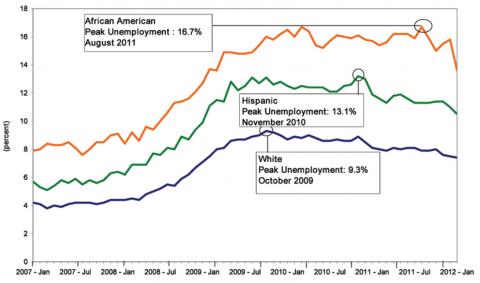The Pew Charitable Trusts has a new report out this week looking at what happens to families of different incomes and racial backgrounds when they suffer a job loss. On first blush, the problem appears surprisingly universal over the past decade, with one-third of all families at some point experiencing a stretch of unemployment.
In this chart from the report, even 23 percent of high-income households saw some unemployment (noted in blue) in the study period (red bars, in contrast, represent six months or more of unemployment over the entire decade).

"Hard Choices: Navigating the Economic Shock of Unemployment" Source: Panel Study of Income Dynamics, 1999-2009
But the real long-term problem isn’t simply losing a job; it’s not having anything to fall back on while you look for a new one. And by this metric, the Pew report shows a notably different pattern when race is taken into account. This chart looks at the liquid assets available to white families and black families to draw on during times of financial stress, including resources like savings and retirement accounts, home equity and stocks:

"Hard Choices: Navigating the Economic Shock of Unemployment" Source: Panel Study of Income Dynamics, 1999-2009
The average black household that experienced unemployment had zero cash to fall back on. And black households that experienced no unemployment in the past decade were still less prepared to weather a financial shock than those white households that did lose a job at some point. The history of our latest economic recession is full of stories of families who had to cash out their retirement accounts or savings for a child's education to make regular payments on rent and bills. But what about families that didn't even have those options?
Pew's report also interviewed several dozen families about their personal experiences with unemployment. A number of them described relying on family inheritance to survive periods of unemployment, a prospect that illustrates how widely varied the resilience of families is in the face of job loss. From the report:
Inherited assets are not evenly distributed among families. Research has shown that black and Hispanic families receive lower overall levels of support from private transfers than white families and are five times less likely to receive inheritances and large gifts. These differences in private assistance contribute to the large differences in wealth accumulation by race, providing a leg up for many white families for household investments and during economic challenges.


Spread the word